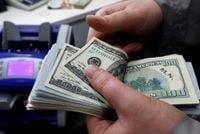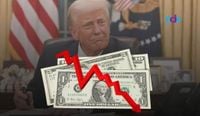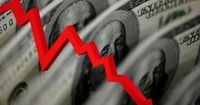On April 1, 2025, the Brazilian financial market experienced notable fluctuations as the dollar closed down against the real, reflecting investor caution ahead of anticipated tariffs from the United States. The commercial dollar was quoted at R$ 5.685, marking a decrease of 0.38% from the previous day, while the tourism dollar also fell by 0.42%, closing at R$ 5.915. These changes come in response to President Donald Trump’s announcement of new tariffs set to take effect on April 2, which are expected to impact trade relations significantly.
The dollar’s decline in Brazil is part of a broader trend that has seen the currency drop 5.89% since Trump's return to the White House. This downward trajectory is concerning for many investors, who fear that the new tariffs could lead to inflationary pressures and even a recession in the U.S., creating ripple effects in global markets.
Market analysts are closely monitoring the situation as Trump prepares to implement a 25% tax on imported vehicles while exempting cars manufactured in the U.S. The U.S. government anticipates raising over $100 billion annually from these tariffs, which are intended to counter what they consider unfair trade practices. However, the lack of specifics regarding which countries and products will be affected has left investors in a state of uncertainty.
William Castro Alves, chief strategist at Avenue, noted that the current environment is pushing investors toward more defensive assets. He explained, "This scenario makes allocations in the stock market more selective and focused on defensive assets." This shift is evident as foreign capital begins to flow into Brazil, attracted by the country’s high-interest rates.
On the Brazilian stock exchange, the Ibovespa index closed up by 0.68% on April 1, driven by strong performances from major companies like Petrobras and Vale, which rose by 0.56% and 1.16%, respectively. The total trading volume reached R$ 11.74 billion, with the index finishing the day at 131,150.63 points. This positive performance in the stock market stands in contrast to the fluctuations in the dollar, highlighting the complex dynamics at play in the current economic landscape.
As the dollar continues to fluctuate, the tourism dollar, which is typically higher due to additional taxes and fees, saw a purchase price of R$ 5.741 and a selling price of R$ 5.921 on April 1. This reflects the ongoing challenges faced by travelers and those engaging in international transactions.
In the U.S., economic indicators such as the JOLTS report revealed a drop of 194,000 job openings in February, contributing to the cautious sentiment among investors. The report highlighted a decrease in labor demand, likely influenced by the uncertainty surrounding the impending tariffs.
As the market prepares for Trump’s announcement, investors are adopting a wait-and-see approach, with many hoping for clarity on how these tariffs will shape the future of international trade. The anticipation has led to increased volatility in both the currency and stock markets.
Trump’s comments over the weekend indicated that the tariffs would affect all countries, dispelling earlier speculation that they might be targeted at specific trading partners. This broad approach has heightened concerns about retaliatory measures from affected nations, which could further complicate global trade relations.
In summary, the Brazilian market is navigating a period of uncertainty as it reacts to U.S. trade policy changes. With the dollar showing signs of weakness and the stock market responding positively, investors remain on high alert for the upcoming tariff announcements. The interplay between these factors will likely continue to influence market dynamics in the coming weeks.








